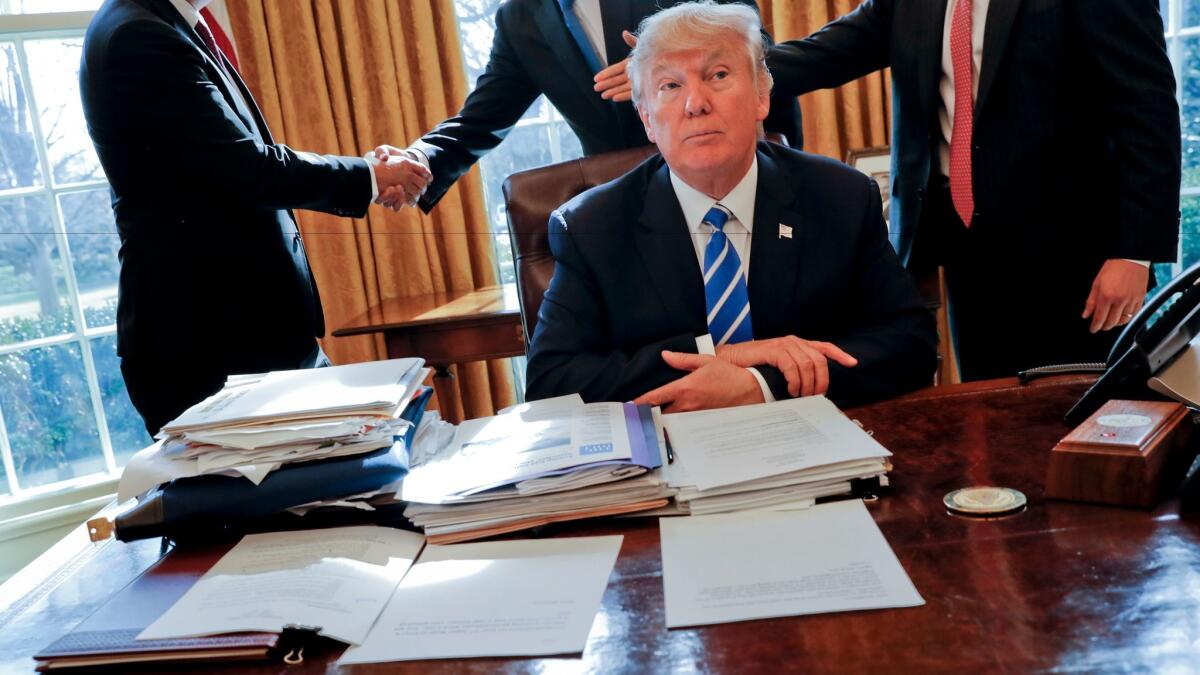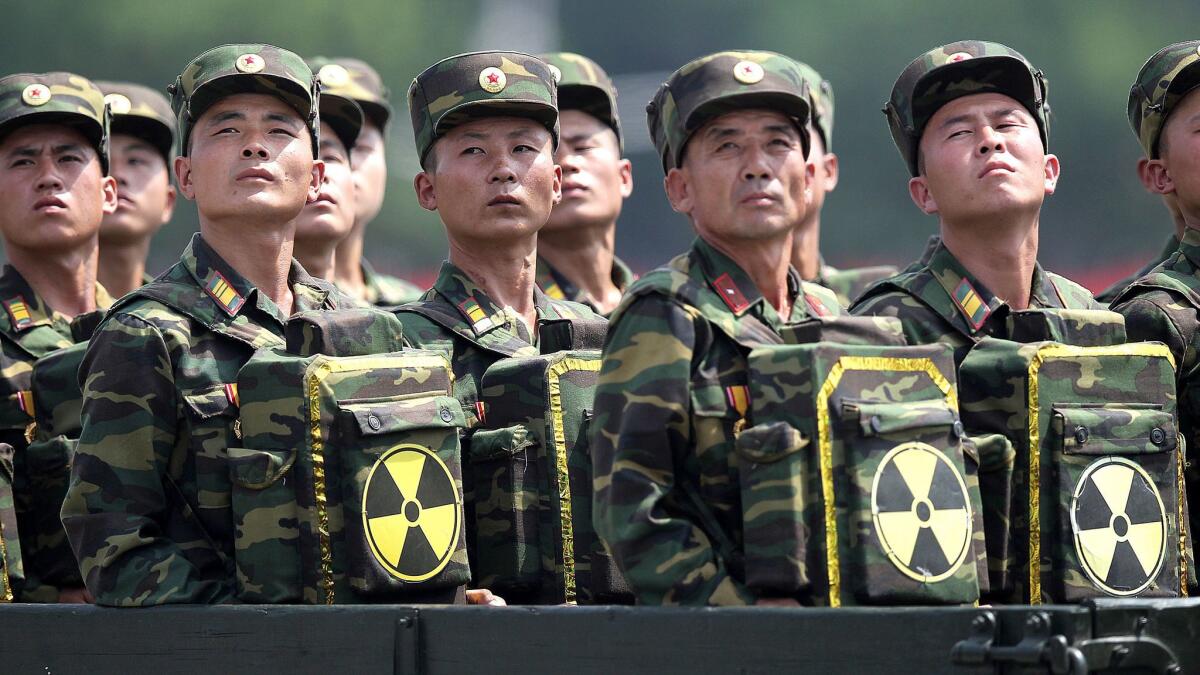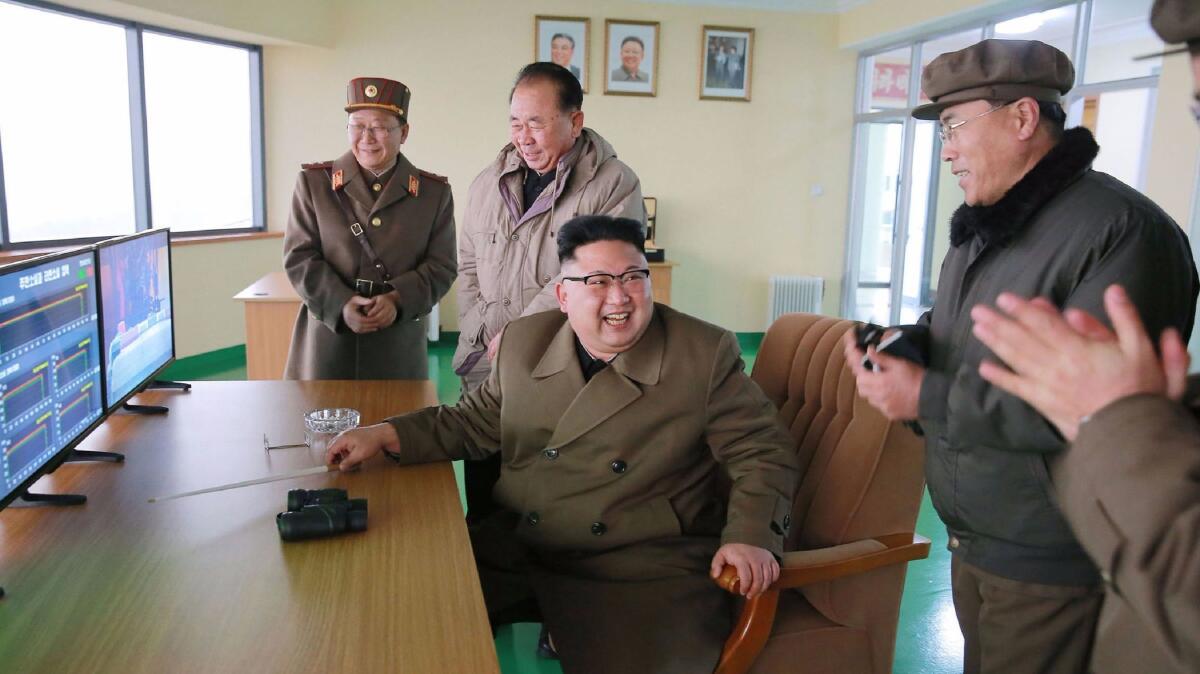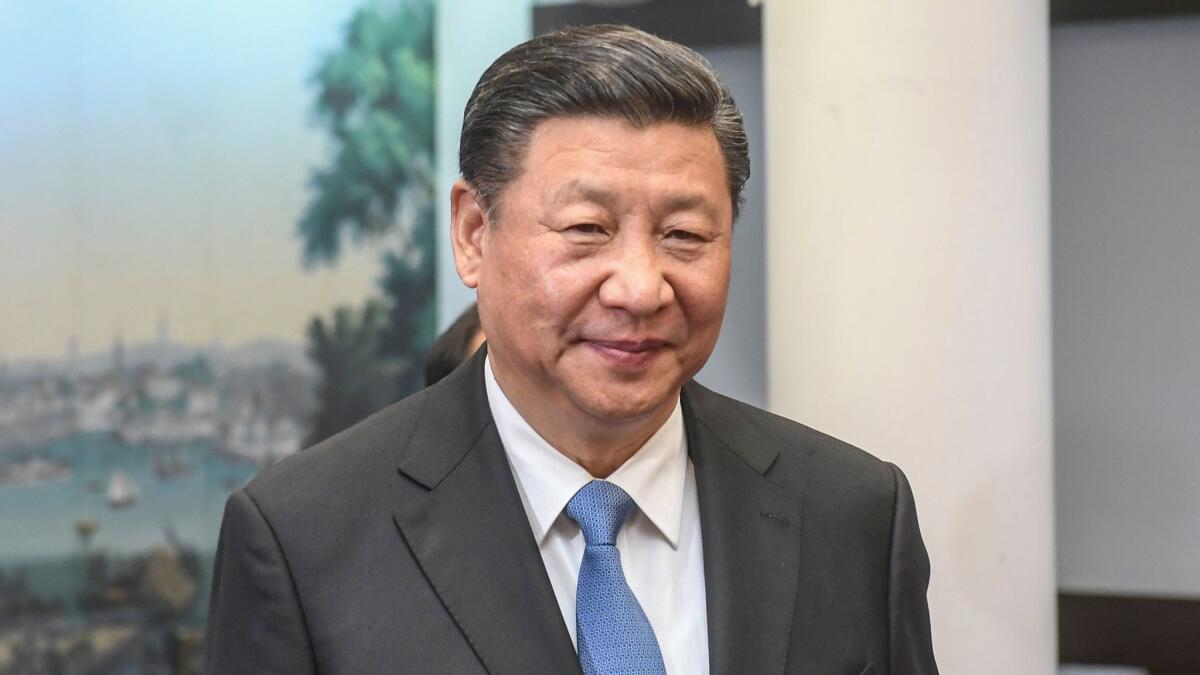Trump’s tough talk on North Korea will be put to the test in his meeting with Chinese leader

- Share via
Reporting from New York — Now it is President Trump’s turn at the plate, after consecutive administrations before him have failed to solve the problem of North Korea.
A considerable portion of this week’s meeting in Florida with Chinese President Xi Jinping will be devoted to the long-festering crisis of North Korea’s nuclear weapons program. Trump’s predecessors have tried various combinations of sticks and carrots, including sanctions and U.N. resolutions, without stopping the juggernaut of a missile and nuclear program that is now sufficiently advanced to pose a credible threat to the United States.
True to his inimitable style, Trump has been talking — and tweeting — tough on North Korea. He had hinted repeatedly that he would support military action to prevent North Korea from developing an intercontinental ballistic missile capable of reaching the United States.
“Well if China is not going to solve North Korea, we will. That is all I am telling you,’’ Trump cryptically told the Financial Times in an interview published this week.

Blustering aside, Trump presumably knows that unilateral military action against Pyongyang could start a war with devastating consequences. Even without advanced weapons of mass destruction, North Korea’s conventional artillery at the demilitarized zone could easily reach the 30,000 U.S. troops in South Korea as well as 25 million South Koreans living in the Seoul metropolitan area.
The calculus hasn’t changed much since 1994, when the Clinton administration considered striking the North Koreans’ main nuclear facility at Yongbyon. South Koreans produced a computer simulation projecting 1 million dead if a war broke out with North Korea. Although all the war games showed North Korea would be quickly defeated, the costs were deemed too high.
Trump is also unlikely to follow through on an off-hand suggestion he made at a campaign rally in Atlanta to invite the rotund young leader, Kim Jong Un, out for a hamburger.
So that leaves Trump stuck dealing with China, which has been North Korea’s benefactor and enabler since 1950, when Mao Tse-tung sent his troops to fight on behalf of their Communist brethren.
With an 850-mile border between the countries, China is North Korea’s lifeline, supplying almost all its fuel oil, imported foods, consumer goods as well as the raw materials used to construct its weapons program.
Beijing has been reluctant to enforce United Nations sanctions against North Korea or to shut down North Korean trading companies in China that handle money for the leadership and import weapons. At military parades in Pyongyang, the North Koreans have shamelessly displayed Chinese-made trucks converted into missile launchers. The Bank of China’s Singapore branch was implicated in a criminal case last year in the island city-state in which a shipping company was convicted of helping North Korea import weapons from Cuba.
“North Korea has faced very few impediments to establishing front companies in China that do global business busting sanctions,” said William Newcomb, formerly the American representative on the U.N. panel that enforces North Korea’s sanctions. “I suspect the [Chinese] Ministry of State Security knows everything about North Korea’s activities, and the fact that they are allowed to continue is pretty disgraceful.”
Going into the meeting Thursday, Trump has the advantage of dealing directly with the only person in China capable of deciding to crack down on the North Koreans.
China’s North Korea policy is handled by the Communist Party Central Committee’s secretive International Liaison Department, often bypassing the Foreign Ministry. It is not dissimilar to the way that Trump has taken some foreign policy matters away from the State Department to be handled in the White House by his closest associates, including son-in-law Jared Kushner.
“You have two alpha males who will be in the same room. Trump wants to come out of this meeting with something tangible that he has achieved,” said Jonathan Pollack, a senior fellow at the Brookings Institution in Washington. And for all their differences, he said, “their grievances about North Korea are not wildly dissimilar.”

Despite its historic ties with North Korea, Beijing has been disdainful of the reckless behavior of Kim Jong Un, who took over in 2011 before his 30th birthday after the death of his father, Kim Jong Il. In more than five years at the helm, Kim Jong Un has yet to visit to Beijing, a sure sign of the falling out between the two.
The young leader has purged many of his elders, including an uncle who was close to the Chinese, and has accelerated the pace of the nuclear and missile program. Since the beginning of last year, the North Koreans have conducted more than two dozen missile tests, the most recent a medium-range ballistic missile fired Wednesday morning from the eastern port of Sinpo.
However, the Chinese balk at any measures that could lead to the collapse of North Korea, an important buffer between its borders and U.S.-allied South Korea. And Trump will have more than met his match when negotiating with Xi, analysts say.
“Xi obviously has not-insignificant amounts of experience dealing with American leaders. He is going to come in better briefed, more knowledgeable of the history and the record and more prepared to deflect critiques and beseeching by the United States,” said Pollack.

Joshua Stanton, a lawyer specializing in North Korea sanctions, said the best leverage that the United States has in the negotiation is to implement so-called “secondary sanctions” against Chinese banks and businesses doing business with North Korea.
“What I hope to see out of this meeting is not Trump and Xi coming out shaking hands and smiling. That probably means that Xi has made a promise he has no intention of fulfilling,” said Stanton.
“We all know that [Trump’s book is] ‘The Art of the Deal,’ but the Chinese read that book too,”said Scott Snyder of the Council on Foreign Relations. “They are well-positioned to call Trump’s bluff.’’
Trump laid down the gauntlet with a sharply worded tweet that warned “It won’t happen!” in response to a New Year’s address in which Kim boasted that his country would soon be able to test an intercontinental ballistic missile.
However, Trump’s bluster and inexperience dealing with the erratic North Korean regime have unnerved Korea specialists who fear that a chain of misunderstandings could lead to another war on the Korean peninsula.
“I don’t like bluffing unless I’m playing for small stakes,” said Robert Gallucci, a professor at Georgetown University who served in the State Department during the 1994 crisis.
Gallucci said that any military response, such as trying to strike a missile on a launch pad, would likely be ineffective because North Korean weapons facilities are hidden underground and scattered around the country.
“You couldn’t ever, ever assume that the North Koreans would just suck it up, and there are vulnerabilities in the South, which is where they would retaliate,” said Gallucci. “We would be involved in a military engagement, and people would die.”
Gallucci believes that the United States must rely on the same strategies of deterrence used during the Cold War. “The Russians had 30,000 nuclear weapons. The North Koreans have 12,” he said.
In 1994, after the Clinton administration decided against airstrikes, former President Jimmy Carter flew to Pyongyang and helped negotiate a pact that gave energy assistance to North Korea in exchange for a nuclear freeze. That deal fell apart under President George W. Bush in 2002 amid evidence that the North Koreans were cheating.
In his second term, Bush tried but failed to negotiate another deal, and the nuclear and missile development programs advanced. The Obama administration was less active on North Korea, engaging in a tactic it called “strategic patience.”
Military analysts disagree on how close North Korea is to being able to launch an ICBM capable of reaching the West Coast of the United States or to mount a nuclear warhead, but most agree it is making rapid progress.
“The breakneck pace of North Korean nuclear ballistic missile and nuclear testing in the past few years means that a North Korean missile tipped with a nuclear warhead, capable of reaching our homeland, is no longer a distant hypothetical, but an imminent danger,” Gen. John E. Hyten, commander of the U.S. Strategic Command, told a congressional panel Tuesday.
Times staff writer W. J. Hennigan in Washington contributed to this report.
ALSO
China pushes back on tougher U.S. approach to North Korea
As he gets ready to meet Trump in Florida, China’s Xi Jinping has a lot to worry about
At Trump’s EPA, going to work can be an act of defiance
More to Read
Sign up for Essential California
The most important California stories and recommendations in your inbox every morning.
You may occasionally receive promotional content from the Los Angeles Times.










